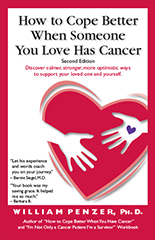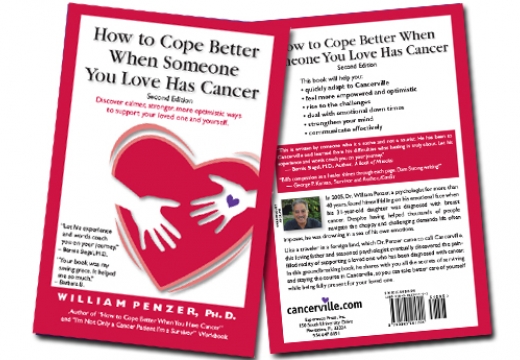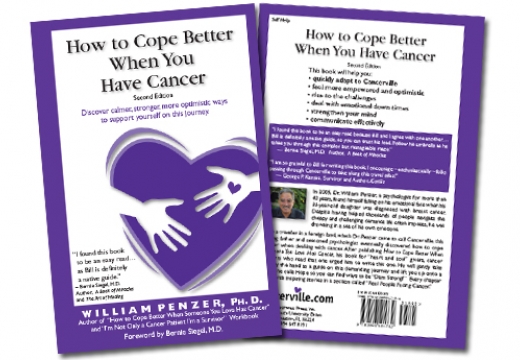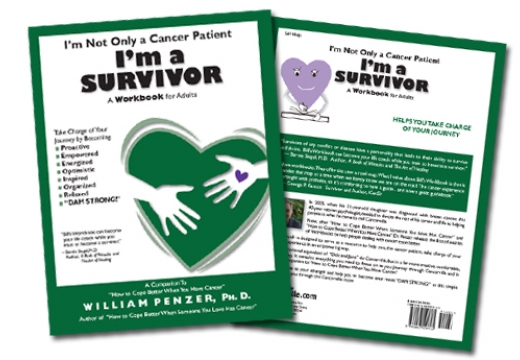 Table of Contents
Table of Contents
Preface
Introduction
An Opening Letter of Hope for Family and Friends with a Loved One in Cancerville
Part I: Getting The Lay of the Land
1. Welcome to Cancerville
2. Converting Rapidly from Powerless to Powerful
3. Striving to Adapt to a Place from Which You Really Want to Run
4. Turning Down the Spotlight on Catastrophe
Part II: Understanding the Land
5. Making Eye Contact with Cancerville
6. Meetings With the Dedicated Doctors
7. Hair Grows Back: Coping with the Physical Effects of Cancer
8. Minds Come Back: Coping with the Emotional Effects of Cancer
Part III: Making the Land Your Own
9. How Minds Work
10. Embracing a Really Simple Philosophy: Realistic Optimism
11. The Power of Positive Self-Talk
12. Calming Your Fears and Anxieties
13. Getting Past Your Guilt
14. Reining in Your Rage
Part IV: Tools That Help You Tend the Land
15. Relaxing Tools for Natural Healing
16. Cognitive Tools for Taking Charge of Your Mind
17. Having a Counselor and/or Support Group in Your Corner
18. Big Boys and Girls Do Cry
19. Laughter in Cancerville
20. Communication in Cancerville
Part V: Putting Distance Between Yourself and the Land
21. No One Really Knows Where the Road Goes
22. Helpful Life Lessons You Can Learn from Your Cancerville Experience
23. A Modern Day Fairytale
A Closing Letter of Caring for Family and Friends with a Loved One in Cancerville
Preface
As I began to write this book, I created a personal image of excellence. I wanted it to push me to write an exceptional book about a less than exceptional topic. The image I chose was symbolic of my goal. I was determined to write a clear and powerful book that would truly help people. I wanted to “knock it out of the park.”
As a kid who grew up in the Bronx, New York, in the 1940’s and 1950’s, I was an avid baseball fan who spent a fair amount of time at Yankee Stadium. I therefore picked the following image to motivate me to write the very best book that I could.
It is the seventh game of the World Series, and the Yankees, are playing their hearts out in their old Stadium on Jerome Avenue. It is the bottom of the ninth inning, and we are down by three runs. There are two outs, and the count is three balls and two strikes. The bases are loaded, and I am at bat. I need to hit a home run—nothing less. That walk-off hit will give us the game and the series.
I want to hear their announcer of old, Mel Allen, screaming at the top of his lungs, saying, “There is a high fly ball to deep, deep center field, that ball is going, going, and it’s gone. The Yankees win the championship. What a hit, what a game, what a series, what a win!”
That was the image I kept in mind while writing this book. I swung as hard as I could and aimed it right at you. I sincerely hope you will catch that ball and that my words will help you to stand tall during a difficult time. That is much more important than the outcome of a baseball game.
I want you and your loved one to win. That is really all I care about.
Introduction
I am sincerely sorry that you need to read this book. I wish you could be reading Danielle Steel, John Grisham, or any other book of your choice. I so wish that your life and your loved one’s life were lighter, brighter, and free of suffering and worry. I hope you get back to that space soon. In the meantime, you have made a good choice. My words will help you through. They have helped many before you. They will help you too. I will walk you through this most difficult situation, while helping you to hang tough and to remain strong.
Most authors, I would imagine, want everyone to read their books. Oddly enough, I want no one to need to read this one. My sincere hope is that this book will become obsolete very soon. I want cancer to be a thing of the past and cancer centers to become empty ghost towns. That may not happen in my lifetime, but I am hoping it will happen. We are closer than ever before—we will get there! For now, I hope you will choose to read this book as a way to gain added strength and support at a difficult time.
Please know that I wrote this Introduction in the same pained and screeching tone with which I viewed the world when my daughter was initially diagnosed with cancer. Yet I soon realized this angry and fearful approach was not the best way to deal with such a serious problem, and I learned how to adopt a more positive, comfortable, and comforting position.
As you continue to read this book, you will find that my voice and its tone and timbre soften, lighten, and seek out hopefulness and optimism in every nook and cranny. My only goal is to help you find those spaces sooner than I did, so you can rise more quickly to the challenge of having a loved one with cancer. For some, my intro is a difficult read, but my book, I believe, is not.
Nothing and I mean nothing prepares a person for dealing with someone they love having cancer. On July 8, 2005, I knew that someday, if I lived long enough, I would write this book for you. At that time, living long didn’t seem quite so important as it previously did or does now. On that torturous day, forever etched onto my brain like a permanent tattoo, I sat in the waiting room of Memorial Sloan- Kettering Cancer Center in New York City.
My wife and I were surrounded by other bleary and teary-eyed, seriously sad, and silent people. We were all ruminating about our collective fates and that of our loved ones. In our minds, as we each stared blankly into space like a room full of zombies, our loved ones were in serious trouble and we felt totally helpless.
So tilted was the windmill of my mind as it whirled and swirled frantically that I didn’t know what to do or say or where to put all of the hyper-fueled energy racing through my mind and body. My wife and I struggled to find our way through this wasteland in order to stay sane, help our daughter, and survive the ordeal, as individuals and as a couple. I am pleased to say that we succeeded even though it took us a while.
Somehow, we stumbled and fumbled our way through, experiencing a wide range of overwhelming emotions. People, who have a loved one with cancer, experience terrorizing fear, rage, confusion, and despair, not to mention a level of depression and anguish of unparalleled proportion. For most people, it is like no other challenge they have ever encountered.
On that day at Sloan-Kettering, I realized many things. I already knew from my work as a psychologist and psychotherapist that life wasn’t always fair, but my experience helping others did not immediately prepare me for helping my family and myself. I was as lost as a tourist in a strange and foreign land, unable to get my bearings or even speak the language. There was no voice of support to hold me up. That is why I knew I would write this book someday.
To get through this difficult territory, you need a strong voice to lead the way. I am honored you are allowing me to be that voice for you. I take that responsibility very seriously. I will teach you how to provide that strength for yourself and your loved one. I have written the book I needed to read that day in the waiting room at Sloan-Kettering.
As we sat there quietly waiting for our daughter’s procedure to begin, my mind was numb, as if frozen by an icy cold frost on a winter’s morning in Montana. When the nurse called Jodi’s name, signaling her turn, she, dressed in a gray hospital gown, stood up quickly and bravely. A single angry thought shot through my head in outraged indignation: “This cannot be my daughter’s turn!”
As Jodi took the first step toward the operating room, elephant-sized tears began to fall down her cheeks as if she were a prisoner on her way to execution. Yet, in reality, she was an innocent victim of cancer. My frozen mind thawed and instantly overheated, as if I had been thrust head first into an oven. My heart skipped multiple beats; I was helpless to prevent the ensuing barbarism. Jodi had to walk these steps on her own.
At that very moment, I realized that cancer was not only a horrible and hated medical diagnosis, but it was also a place as well. I knew then that my daughter, my wife, and I had entered what I came to call Cancerville.
Consider this book a guide to a place you really never wanted to visit. Like Jodi, your loved one was never given a choice—just a by-invitation-only command in the form of an X-ray, MRI, blood test, biopsy, or any combination of the above.
As our beautiful thirty-one-year-old daughter was led into the operating room for a mastectomy, we shakily made our way back to the waiting room. It was Jodi’s boyfriend, Zev, whom we hardly knew, my wife, Ronnie, and myself. Jodi and Zev had been living together for less than six months. To his credit, Zev did not bolt. He is a very special man, as not all men stay the course. Over the years, since that day at Sloan-Kettering, Ronnie and I have become very close to Zev and love him as our own. At the end of this book, I will tell you the very special fairy tale we all enjoyed several years later.
Turning back in time even further, I can tell you that it was a phone call in June from Jodi that announced the biopsy results. What was a little lump in Jodi’s breast with less than a one percent chance of being malignant was just that. The way we entered Cancerville reminded me of a game I played as a kid in the Bronx, called, “tag, you’re it.” Cancerville had tagged someone we loved; but this was no game. Instead, it was a mind-and-body damaging, life-and-death serious reality.
In response, I sat in the Sloan-Kettering waiting room hoping a terrorist bomb would blow us all up. Why not? Terrorism was happening in the operating room, and we sat there passively allowing it to occur. At that moment, life had very little meaning as I struggled to picture a happily ever after conclusion.
I wanted to run into the operating room and rip the sharpened scalpel right out of the doctor’s hands; but he was just doing his job, and what a job he had. He was trying his very best to save our daughter’s life. At that very moment, though, it felt much more like a dirty trick than a treatment. It was a macabre Halloween scene, without costumes or candy. There are so many different, difficult, and dark images that immediately come to our minds when someone we love enters Cancerville. Slowly, but surely, you and I will work together to eliminate or minimize them, one by one.
Mark my words, for they are true. When someone you deeply love with all of your heart feels Cancerville’s bite, you feel it very strongly too. It is because of your excruciating and, at times, overwhelming emotional pain that I wrote this book. I am confident that my words can help ease your pain and give you a stronger and clearer perspective on how you can contribute to your and your loved one’s journey through this harsh place.
There is no denying that Cancerville will test both you and your loved one in ways you could never have imagined. If there is any good news, however, it is that you and your loved one will likely rise to each and every challenge, finding strength neither of you ever knew you had. You can and you will get through this, and I will help you.
In this regard, I admit that I didn’t start out the best way. I drank at least five airplane bottles of vodka in the men’s room at Sloan-Kettering where I discovered my own BYOB bar. I was hoping to raise my spirits by drinking them. I was at least hoping to slow down my racing mind. The problem was that five bottles weren’t enough. Nothing, except perhaps a knockout drug, could diminish the level of anguish I was feeling.
The adrenaline that ran through my body that day more than neutralized the alcohol. The only good thing about finding a bar in a restroom is that you are not very far from a urinal. That benefit notwithstanding, I don’t encourage your following my lead. Yet I have a feeling that I am not the first or the last to stumble upon that bar. In fact, “stumble” may be the key word in that sentence.
Let us clearly understand from the beginning that cancer is a formidable foe. In my youth it was called the big C and not discussed. It was almost always a death sentence. Amazing-grace progress has been made over the past fifty years of research, particularly of late.
Cancer is also a complicated set of different diseases. Each type has its own unique issues, prototypes, and protocols, and there are so many unknowns. As people, we crave certainty. We feel better knowing everything will be okay and that our story will have a happily ever after ending. Unfortunately, you don’t often get that reassurance in Cancerville. Sometimes, there is no point asking the question because no one has the answer. The easiest case can go wrong and the worst can be fine. I will teach you to give that affirmative reassurance to yourself.
Another scary Cancerville story pushed me to write this book. In June 2010, I received an email from Phil, my friend of almost fifty years. One of his twin eight-year-old grandsons had been diagnosed with a very serious form of leukemia. Cancerville had struck again.
As a psychologist, I am used to hearing bad news in my practice. Caring therapists and counselors tend to cry on the inside as they listen to the sad tales of those they are trying to help. The night I received my friend’s scary message, my tears flowed furiously down my cheeks like a saltwater faucet. I was crying because I knew all too well the place he and his family were about to enter. I anticipated their heartache and heartbreak. Once again, those strong feelings that Cancerville can create came rushing back to me. I knew that my friend’s family was heading into the bowels of hell and I felt powerless to help them.
From that frustrated sense of impotence, a simple idea came trickling to the surface. On impulse, I sent Rob, my friend’s son and father of the stricken boy, an email. I wondered to myself whether I could help guide him through Cancerville as one father who had been there, to another who had just entered.
Though I knew Rob and saw him on occasion at family parties, followed his successful career as an attorney with interest, and enjoyed the two novels he had written in his “spare” time, we had no meaningful relationship. He was my friend’s son. He, like me, seemed to thrive on being productive, accomplishing goals, and solving problems. Therefore, I suspected he would feel as furiously frustrated as I did in the uncharted and murky waters of Cancerville. I had no idea how, or even if, he would respond to the email that I sent him.
As it turned out, Rob’s response was more than encouraging. He said that he had received hundreds of emails since his son had been diagnosed, and that he had deleted all of them except the one I sent. He had printed mine out and read it several times a day. That led to an ongoing series of email communications between Rob and me, that helped him travel the obstacle course of Cancerville.
Helping Rob has helped me in many ways. Not only did my emails to him form an outline of what follows, but his positive response to my words of encouragement gave me the confidence and courage to write this book. I have come to realize that I left a piece of me in Cancerville. My communication with Rob and others in Cancerville, as well as my work on this book, has helped me to reclaim it, like an expensive suit left at the dry cleaners for too long. The good news is that the suit still fits. I wish I could say that about my real suits after six years, but hey, I am working on it. I am pleased to have found this piece of me that I left behind. By writing this book I am not exiting Cancerville, but rather re-entering it with a brand new view.
That my words helped Rob means that my words may be able to help you as well. Ultimately, that is all we can do in Cancerville— help each other as best we can to get through this most difficult and demanding ordeal. We are all sisters and brothers united by a common bond. Given that the common bond really socks it to us, let’s do our personal best to make the best of Cancerville. The words that follow will help you take on Cancerville’s challenge, make Cancerville your own, and ultimately own it for the good of your loved one and yourself.
Know that not all professionals agree about promoting positivism in Cancerville. They are concerned about people being unrealistic. They may also be concerned that people will feel that they are “ failing” when they can’t sustain a hopeful and positive attitude. As you will learn, my beliefs are all based upon a philosophy I call realistic optimism. Be aware from the onset, that few people can be consistently positive and optimistic in Cancerville or in other complicated situations. People’s moods in Cancerville are often in flux and tend to go up and down as events unfold. My goal is to teach you tools that will help you return to neutral or positive feelings whenever you can.
Admittedly, I started out in Cancerville on my hands and knees, kicking and screaming, until I finally figured out that I needed to get to a much more stable place. My years of helping others ultimately helped me to help myself. My simple goal right now is to reach out to you, so I can help you find that positive place more quickly and more often. A hopeful and positive mindset is key to making this very unpleasant experience a little easier to bear.
Now, please reach out and grasp my hand. Though it seems silly, I mean it seriously; indulge me for a very brief moment. Instead of feeling foolish, try to feel empowered. Every little bit of support helps in Cancerville. Imagine my tight grip leading the way so we can get going. We have a long and demanding journey ahead.
I am firmly convinced that hope is essential in or out of Cancerville; without hope we are lost and doomed to despair, depression, and defeat. As Barbara Streisand so beautifully sang, “Walk on, walk on, with hope in your heart, and you’ll never walk alone.” As Maya Angelou so beautifully wrote, “Hope slips through the tangle of our fears and evicts despair.”
With hope, you and your loved one have a fighting chance—in today’s world, a very good chance at that!
William Penzer, Ph.D.
July 8, 2011






 Table of Contents
Table of Contents